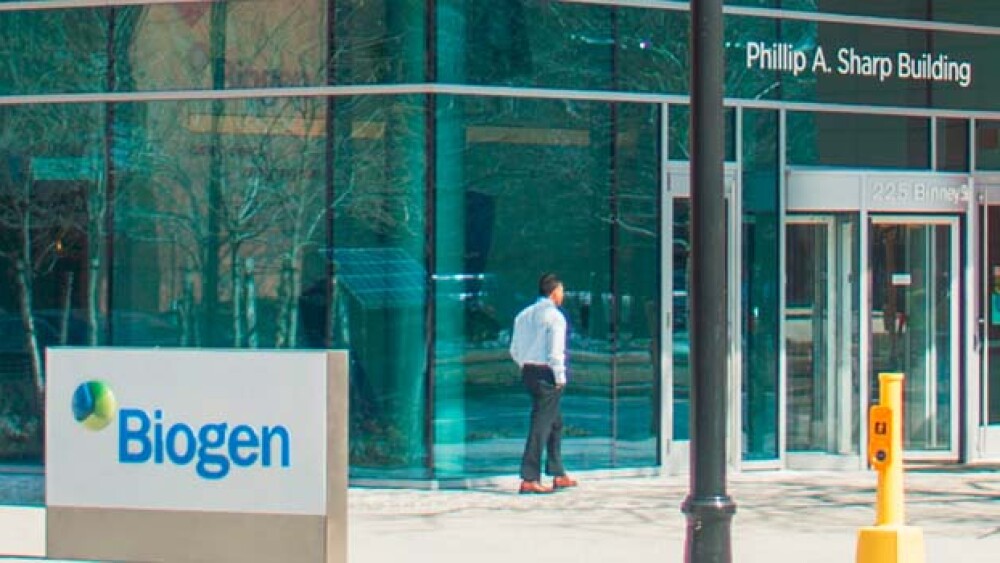The Hillerod subsidiary, Denmark Manufacturing ApS, has about 800 staffers, who are expected to continue working under Fujifilm.
Cambridge, Mass.-based Biogen announced it is selling its biologics manufacturing operations in Hillerod, Denmark to Toyko-based FUJIFILM for up to $890 million in cash. The Hillerod subsidiary, Denmark Manufacturing ApS, has about 800 staffers, who are expected to continue working under Fujifilm.
Under the terms of the deal, Fujifilm will buy the shares of the Biogen subsidiary in cash, subject to minimum purchase commitment guarantees and other contractual terms. Biogen also will sign manufacturing services agreements with Fujifilm. Fujifilm will use the site to produce commercial products for Biogen, such as Tysabri, in addition to working with other companies to manufacture biologics.
“We continually evaluate our manufacturing strategy and we believe that this agreement serves the best interest of our employees, customers, partners and shareholders,” stated Michel Vounatsos, Biogen’s chief executive officer. “As we continue to diversify our portfolio across multiple modalities and bring online our state-of-the-art manufacturing facility in Solothurn, Switzerland, we believe that we have enhanced our manufacturing capabilities and capacity for biologics with this transaction. Fujifilm is a well-respected leader in manufacturing biologic products and they share our pioneering culture.”
The Hillerod plant includes a 90,000L biologics manufacturing facility with assembly, labeling and packing operations, quality control laboratories and warehouses.
After this deal closes, Biogen will continue to maintain manufacturing operations in Research Triangle Park, NC, and Solothurn, Switzerland. The Switzerland site is expected to be operational by the end of 2020.
Reuters notes that Fujifilm is attempting to boost its healthcare business as its legacy photocopy operations stagnate. In 2018, it committed to acquiring two biotechnology units from JXTG Holdings Inc. for about $800 million. Fujifilm’s imaging and healthcare businesses both brought in about the same revenue for the nine-month period leading to December, but the healthcare businesses grew at a faster pace, 11 percent year-on-year growth compared to the imaging division’s 2 percent growth.
“We will expand our contract development and manufacturing organization (CDMO) business with 20 percent growth rate which is higher than it has been,” Kenji Sukerno, Fujifilm’s president and chief operating officer, told reporters.
Fujifilm, after the deal closes, plans to hit its $900 million revenue target in its CDMO business by 2021, two years earlier than its previously stated goal. In fiscal year 2018, it expects to earn about 40 billion yen, or about $359.8 million (U.S.).
Just last week, Biogen announced it was acquiring Nightstar Therapeutics, a clinical-stage gene therapy biotech based in London, UK. That deal was for $25.50 in cash for each Nightstar share, coming to about $800 million.
Nightstar focuses on adeno-associated virus (AAV) treatments for inherited retinal disorders.
“Ophthalmology is an emerging growth area for Biogen, and we are excited about the opportunity to work with the talented employees at Nightstar to advance potentially transformative gene therapy programs for rare retinal disorders,” Vounatsos stated. “With this proposed acquisition, we are continuing to bolster our pipeline and further execute on our strategy to develop and expand a multi-franchise neuroscience pipeline across complementary modalities. Nightstar would accelerate our entry into ophthalmology by contributing two mid- to late-stage gene therapy assets, with the potential to create long-term shareholder value.”





